《高级英语》课程PPT教学课件(第六册)Unit 3 Bards of the Internet By Phillip Elmer-Dewitt
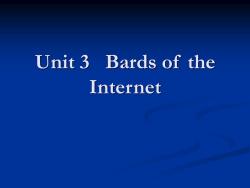
Unit 3 Bards of the Internet
Unit 3 Bards of the Internet
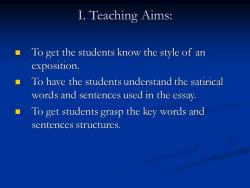
I.Teaching Aims: To get the students know the style of an exposition. To have the students understand the satirical words and sentences used in the essay. To get students grasp the key words and sentences structures
I. Teaching Aims: ◼ To get the students know the style of an exposition. ◼ To have the students understand the satirical words and sentences used in the essay. ◼ To get students grasp the key words and sentences structures
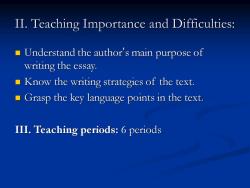
II.Teaching Importance and Difficulties: Understand the author's main purpose of writing the essay. Know the writing strategies of the text. Grasp the key language points in the text. III.Teaching periods:6 periods
◼ Understand the author’s main purpose of writing the essay. ◼ Know the writing strategies of the text. ◼ Grasp the key language points in the text. III. Teaching periods: 6 periods II. Teaching Importance and Difficulties:
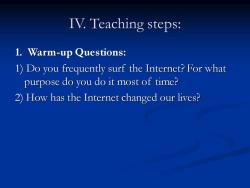
IV.Teaching steps: 1.Warm-up Questions: 1)Do you frequently surf the Internet?For what purpose do you do it most of time? 2)How has the Internet changed our lives?
1. Warm-up Questions: 1) Do you frequently surf the Internet? For what purpose do you do it most of time? 2) How has the Internet changed our lives? IV. Teaching steps:
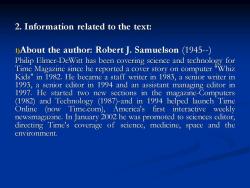
2.Information related to the text: )About the author:Robert J.Samuelson (1945-) Philip Elmer-DeWitt has been covering science and technology for Time Magazine since he reported a cover story on computer "Whiz Kids"in 1982.He became a staff writer in 1983,a senior writer in 1993,a senior editor in 1994 and an assistant managing editor in 1997.He started two new sections in the magazine-Computers (1982 and Technology (1987)-and in 1994 helped launch Time Online (now Time.com),America's first interactive weekly newsmagazine.In January 2002 he was promoted to sciences editor, directing Time's coverage of science,medicine,space a and the environment
2. Information related to the text: 1)About the author: Robert J. Samuelson (1945-) Philip Elmer-DeWitt has been covering science and technology for Time Magazine since he reported a cover story on computer "Whiz Kids" in 1982. He became a staff writer in 1983, a senior writer in 1993, a senior editor in 1994 and an assistant managing editor in 1997. He started two new sections in the magazine-Computers (1982) and Technology (1987)-and in 1994 helped launch Time Online (now Time.com), America's first interactive weekly newsmagazine. In January 2002 he was promoted to sciences editor, directing Time's coverage of science, medicine, space and the environment
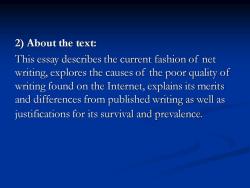
2)About the text: This essay describes the current fashion of net writing,explores the causes of the poor quality of writing found on the Internet,explains its merits and differences from published writing as well as justifications for its survival and prevalence
2) About the text: This essay describes the current fashion of net writing, explores the causes of the poor quality of writing found on the Internet, explains its merits and differences from published writing as well as justifications for its survival and prevalence
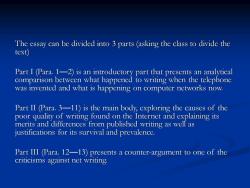
The essay can be divided into 3 parts (asking the class to divide the text) Part I (Para.1-2)is an introductory part that presents an analytical comparison between what happened to writing when the telephone was invented and what is happening on computer networks now. Part II (Para.3-11)is the main body,exploring the causes of the poor quality of writing found on the Internet and explaining its merits and differences from published writing as well as justifications for its survival and prevalence. Part III (Para.12-13)presents a counter-argument to one of the criticisms against net writing
The essay can be divided into 3 parts (asking the class to divide the text) Part I (Para. 1—2) is an introductory part that presents an analytical comparison between what happened to writing when the telephone was invented and what is happening on computer networks now. Part II (Para. 3—11) is the main body, exploring the causes of the poor quality of writing found on the Internet and explaining its merits and differences from published writing as well as justifications for its survival and prevalence. Part III (Para. 12—13) presents a counter-argument to one of the criticisms against net writing
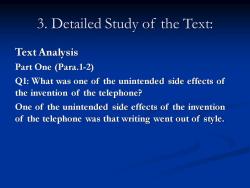
3.Detailed Study of the Text: Text Analysis Part One (Para.1-2) Q1:What was one of the unintended side effects of the invention of the telephone? One of the unintended side effects of the invention of the telephone was that writing went out of style
Text Analysis Part One (Para.1-2) Q1: What was one of the unintended side effects of the invention of the telephone? One of the unintended side effects of the invention of the telephone was that writing went out of style. 3. Detailed Study of the Text:
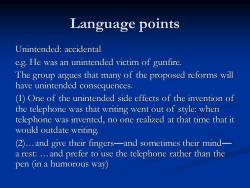
Language points Unintended:accidental e.g.He was an unintended victim of gunfire. The group argues that many of the proposed reforms will have unintended consequences. (1)One of the unintended side effects of the invention of the telephone was that writing went out of style:when telephone was invented,no one realized at that time that it would outdate writing. (2).and give their fingers-and sometimes their mind- a rest:.and prefer to use the telephone rather than the pen (in a humorous way)
Unintended: accidental e.g. He was an unintended victim of gunfire. The group argues that many of the proposed reforms will have unintended consequences. (1) One of the unintended side effects of the invention of the telephone was that writing went out of style: when telephone was invented, no one realized at that time that it would outdate writing. (2).and give their fingers—and sometimes their mind— a rest: .and prefer to use the telephone rather than the pen (in a humorous way) Language points
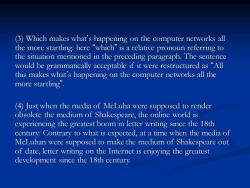
(3)Which makes what's happening on the computer networks all the more startling:here "which"is a relative pronoun referring to the situation mentioned in the preceding paragraph.The sentence would be grammatically acceptable if it were restructured as "All this makes what's happening on the computer networks all the more startling". (4)Just when the media of McLuha were supposed to render obsolete the medium of Shakespeare,the online world is experiencing the greatest boom in letter writing since the 18th century:Contrary to what is expected,at a time when the media of McLuhan were supposed to make the medium of Shakespeare out of date,letter writing on the Internet is enjoying the greatest development since the 18th century
(3) Which makes what’s happening on the computer networks all the more startling: here “which” is a relative pronoun referring to the situation mentioned in the preceding paragraph. The sentence would be grammatically acceptable if it were restructured as “All this makes what’s happening on the computer networks all the more startling”. (4) Just when the media of McLuha were supposed to render obsolete the medium of Shakespeare, the online world is experiencing the greatest boom in letter writing since the 18th century: Contrary to what is expected, at a time when the media of McLuhan were supposed to make the medium of Shakespeare out of date, letter writing on the Internet is enjoying the greatest development since the 18th century
按次数下载不扣除下载券;
注册用户24小时内重复下载只扣除一次;
顺序:VIP每日次数-->可用次数-->下载券;
- 《高级英语》课程PPT教学课件(第六册)Unit 1 Technology in Reverse Robert J. Samuelson.ppt
- 《高级英语》课程PPT教学课件(第六册)Unit 6 Matriculation Fixation Joe Queenan.ppt
- 《高级英语》课程PPT教学课件(第五册)UNIT10 Love and Resentment Barbara Bick.ppt
- 《高级英语》课程PPT教学课件(第五册)UNIT 8 The Art of Smart Guessing Bryan W. Mattimore.ppt
- 《高级英语》课程PPT教学课件(第五册)UNIT 7 How America Lives James A. Michener.ppt
- 《高级英语》课程PPT教学课件(第五册)UNIT 3 A Hanging George Orwell.ppt
- 《高级英语》课程PPT教学课件(第五册)UNIT 9 Pigskin English Robert MacNeil.ppt
- 《高级英语》课程PPT教学课件(第五册)UNIT 6 Give me Liberty or Give me Death Patrick Henry.ppt
- 《高级英语》课程PPT教学课件(第五册)UNIT 5 Force of Nature Barbara Goldsmith.ppt
- 《高级英语》课程PPT教学课件(第五册)UNIT 4 The Girl in the Fifth Row Leo Buscaglia.ppt
- 《高级英语》课程PPT教学课件(第五册)UNIT 2 The Struggle to Be an All-American Girl Elizabeth Wong.ppt
- 《高级英语》课程PPT教学课件(第五册)UNIT 1 The Fourth of July.ppt
- 《高级英语》课程教学资源(试卷习题)第六册 Unit 10 习题(答案).docx
- 《高级英语》课程教学资源(试卷习题)第六册 Unit 9 习题(答案).docx
- 《高级英语》课程教学资源(试卷习题)第六册 Unit 8 习题(答案).doc
- 《高级英语》课程教学资源(试卷习题)第六册 Unit 7 习题(答案).doc
- 《高级英语》课程教学资源(试卷习题)第六册 Unit 6 习题(答案).doc
- 《高级英语》课程教学资源(试卷习题)第六册 Unit 5 习题(答案).doc
- 《高级英语》课程教学资源(试卷习题)第六册 Unit 4 习题(答案).doc
- 《高级英语》课程教学资源(试卷习题)第六册 Unit 3 习题(答案).doc
- 《高级英语》课程PPT教学课件(第六册)Unit 8 Being There Anatole Broyard.ppt
- 《高级英语》课程PPT教学课件(第六册)Unit 2 A Class Act Florence Cartlidge.ppt
- 《高级英语》课程PPT教学课件(第六册)Unit 4 Disney World - Cities of Simulation as Postmodern Utopias Ken Sanes.ppt
- 《高级英语》课程PPT教学课件(第六册)Unit 5 What Are Our Real Values? By Nicols Fox.ppt
- 《高级英语》课程PPT教学课件(第六册)Unit 7 A Few Kind Words for Superstition Robertson Davies.ppt
- 《高级英语》课程PPT教学课件(第六册)Unit 9 I’d Rather Be Black Than Female Shirley Chisholm.ppt
- 《高级英语》课程PPT教学课件(第六册)Unit 10 Two Truths to Live By Alexander M. Schindler.ppt
- 《英语翻译》课程教学资源(翻译教程)庄绎传——翻译漫谈.doc
- 《英语翻译》课程教学资源(翻译教程)许渊冲——翻译的艺术(PDF电子版).pdf
- 《英语翻译》课程教学资源(翻译教程)汉英法律翻译教程.doc
- 《英语翻译》课程教学资源(翻译教程)南华大学汉英翻译教程(PPT讲稿).ppt
- 《英语翻译》课程教学资源(翻译教程)上外老师翻译教程(共三十六课).pdf
- 《英语翻译》课程教学资源(翻译教程)商务英语翻译教程 College Business English A Course for Translation.pdf
- 《英语翻译》课程教学资源(翻译教程)实用翻译教程 A Practical Coursebook on Translation.pdf
- 《英语翻译》课程教学资源(翻译教程)复旦大学着名教授英译汉翻译讲义.doc
- 《英语翻译》课程教学资源(翻译教程)孟庆升新编英汉翻译教程.doc
- 《英语翻译》课程教学资源(翻译教程)英译汉教程教学指导书(学生用).doc
- 《英语翻译》课程教学资源(翻译教程)厦门大学外文学院英语系《汉英翻译》讲义 Chinese-English Translation.pdf
- 《英语翻译》课程教学资源(翻译教程)张培基——英汉翻译教程 A Course in English-Chinese Translation.doc
- 《英语翻译》课程教学资源(翻译教程)简明英语口译教程 A CURRENT CONCISE PRACTICAL COURSE OF INTERPRETATION.pdf
